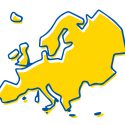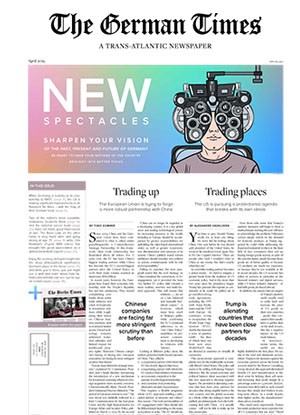The European Union is trying to forge a more robust partnership with China
Since 2003, China and the European Union have been committed to what is called, rather grandiloquently, a Comprehensive Strategic Partnership. In this framework, their trade relationship has flourished above all others. For 17 years now, the EU has been China’s biggest trading partner, while China has become the EU’s second-biggest partner after the United States. In 2018, their trade volume reached an impressive $682 billion.
In recent years, however, the Europeans have found their economic relationship with the People’s Republic less and less satisfactory. They started complaining ever louder about unfair trade relations and a lack of reciprocity in investment relations while toughening their stance on Chinese business practices, such as restricted market access, forced technology transfer, unlimited industrial subsidies and limited respect for intellectual property rights. Moreover, Chinese companies buying or buying into European enterprises are facing far more stringent scrutiny than before.
“Europe must defend its strategic interests,” explained EU Commission President Jean-Claude Juncker, announcing the introduction of a new mechanism for investment screening whenever a foreign acquisitor raises security concerns. Characteristically blunt, French President Emmanuel Macron chimed in: “The period of European naiveté is over.” The new mood was faithfully reflected in a Joint Communication by the European Union and the High Representative for Foreign Affairs and Security Policy, published on March 12, 2019. By the second paragraph, the document already struck a bold new tone:
“There is a growing appreciation in Europe that the balance of challenges and opportunities presented by China has shifted. In the last decade, China’s economic power and political influence have grown with unprecedented scale and speed, reflecting its ambitions to become a leading global power. “China can no longer be regarded as a developing country. It is a key global actor and leading technological power. Its increasing presence in the world, including in Europe, should be accompanied by greater responsibilities for upholding the rules-based international order, as well as greater reciprocity, non-discrimination and openness of its system. China’s publicly stated reform ambitions should translate into policies or actions commensurate with its role and responsibility.”
Pulling no punches, the next paragraph stated that the 2016 Strategy on China remained the cornerstone of EU engagement, yet it provided the basis “for further EU policy shift towards a more realistic, assertive and multi-faceted approach. This will ensure that relations […] are set on a fair, balanced and mutually beneficial course.” (A footnote, which must have stuck in Beijing’s gullet, while confirming the EU’s continued adherence to its “one China Policy,” underlines its persistent commitment to developing its relations with Taiwan.)
Looking at different policy areas, the authors presented multi-faceted pictures of China.
They called it:
a cooperation partner with whom the EU has closely aligned objectives,
a negotiating partner with whom the EU needs to find a balance of interests,
an economic competitor in the pursuit of technological leadership,
and a systemic rival promoting alternative models of governance.
“This requires a flexible pragmatic whole-of-EU approach enabling a principled defense of interests and values,” they reason. “The tools and modalities of EU engagement with China should also be differentiated depending on the issues and policies at stake. The EU should use linkages across different policy areas and sectors in order to exert more leverage in pursuit of its objectives.”
Reviewing relations with China, the Commission and the High Representative recommend that “the EU should robustly seek more balanced and reciprocal conditions governing the eco nomic relationship.” To change the current balance, they propose 10 actions. These range from promoting reciprocity and opening up procurement opportunities in the People’s Republic, to calling on China to deliver on existing joint EU-China commitments – clearly a reaction to the fact that China has been generous in making announcements and signing agreements but very hesitant to really take action; it loves to repackage undelivered old promises as new concessions. Action 10 envisages the unveiling “of security risks by foreign investment in critical assets, technologies and infrastructure.”
Such unaccustomed candor must have taken the Chinese aback. It was an inauspicious backdrop to the 21th EU-China summit. Small wonder that it took the delegations in Brussels 50 hours to smooth over the differences. Looking back, President of the European Council Donald Tusk described the negotiations as “difficult but ultimately fruitful.” Any close analysis of the seven-page final statement does not necessarily bear this out. While a breakdown was avoided, it is hard to say whether a breakthrough was achieved. It all depends on how lax or loyal China will be in following through this time.
The commitments made by both sides are more about future talks than about specific actions. Bland formulations abound – such as the EU and China “commit to ensure equitable and mutually beneficial cooperation in bilateral trade and investment”; they “agree to maintain communication”; they “welcome future exchanges”; they “agree to intensify efforts”; and they “agreed to forge synergies.”
What would a win-win look like? I suggest the following:
Diplomatic wins for China: The EU did not make any references to China as a systemic rival, nor did it call Chinese trade practices unfair. Moreover, the EU agreed to forge synergies between China’s Silk Road Project and its own Connecting Europe and Asia program. And Premier Li could take away the assurance that Huawei will not be excluded from participating in the installation of the G5 network in the EU.
Diplomatic wins for the EU: China vowed to boost trade with the European Union by providing a level playing field. Premier Li Keqiang promised to broaden market access, oppose forced technology transfers and to cooperate on WTO reform concerning industrial state subsidies. Most important, however, China pledged to sign an investment deal with China “by the end of next year, or earlier.” It’s been a bone of contention between them for several years.
The Europeans certainly liked Premier Li’s statement that Beijing was by no means trying to divide the European Union: “We emphatically support the European integration process in the hope for a united and prosperous Europe,” he wrote in Handelsblatt, Germany’s leading economic newspaper. The proof in the pudding is in the eating, of course. Li traveled from Brussels to Dubrovnik for a meeting with the 16+1 Group founded by the Chinese in 2012, comprising 11 EU members and five non-EU Balkan states. It has become the extension of China’s Silk Road Initiative into Europe – and a source of worry that China would use it to drive a wedge into the EU. Li rejected this allegation forcefully. He also no longer spoke of 16+1, or 1+16, as the Chinese chose to call it, but more modestly of “Cooperation of China with Central and Eastern European countries.” It remains to be seen whether that is anything more than verbal cosmetics. The same goes for Europe’s future relationship with the Silk Road Initiative. Is Beijing really willing to relinquish absolute control over its worldwide infrastructure crusade?
The Brussels summit could become a true turning point. And whatever differences remain, Europe and China have rediscovered that they have not only problems with one another but also many significant common interests. For example, they stand shoulder to shoulder in the fight against climate change. Upholding free trade and averting protectionism is another shared interest, as is saving the Iran nuclear deal. In the looming new world order, China is going to play a momentous role. Like other great powers, it will at times be a partner, at other times a competitor and occasionally even an antagonist. But it is not an enemy. While its relationship with Europe may remain ambivalent, precarious and arduous, the two parties can achieve many positive objectives if they concentrate on their commonalities rather than on their differences. Cooperation should be the motto, not confrontation.
Theo Sommer
is Executive Editor of The German Times.




